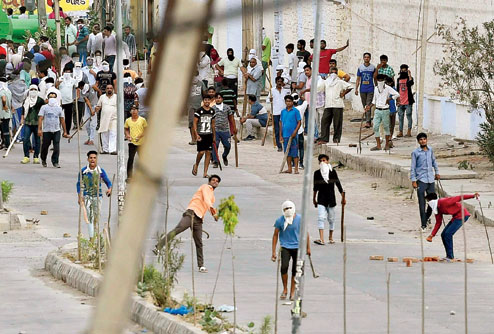
New Delhi, Aug. 25: Clinical psychologists tonight attributed the day's mob violence after the rape conviction of a religious sect's leader to two factors: cult membership and mob psychology.
They said the rioters were probably driven by feelings of blind loyalty to the group and its leader and also by a diminished capacity for independent thinking.
"This is typical mob behaviour. A few people incite the violence, but people in the mob lose their capacity for thinking independently," said Manju Mehta, former head of clinical psychology at the All India Institute of Medical Sciences, New Delhi.
Experts said the violence may also have stemmed from anger at the court verdict, which some group members may have delusionally viewed as an attack on themselves.
"This is cult psychology - blind faith to the point that the leader is seen as flawless," said Shefali Batra, a Mumbai-based psychiatrist and cognitive therapist. "Those engaged in the violence were unable to accept the verdict."
Many such followers, Batra said, may also have been "unable to digest" the sharp contrast between the crime for which Gurmeet Ram Rahim was convicted and the humanitarian activities his organisation had associated itself with over the years.
The Dera website says it runs campaigns to promote cleanliness, blood donation, eye donation, women's empowerment, matrilineal inheritance, food and clothes' banks, self-defence training for women, and shelters for the destitute, among other activities.
"In a culture where it is relatively easy to divinify an individual, their followers may refuse to consider that the person may also have flaws," Batra said.
The experts also said that the rapid flare-up following the verdict suggested that most of the followers, who had congregrated along the streets of Panchkula and Sirsa, had anticipated a not-guilty verdict.
"The guilty verdict challenged their belief system -they viewed the head of their sect as someone who could do no wrong at all," said Nitin Gupta, professor of psychiatry at the Government Medical College, Chandigarh, and member of the executive council of the Indian Association of Social Psychiatry.
Gupta said the Dera followers who had come out on the streets today were unlikely to have any access to the exact details of the rape case or the evidence the court had taken into account.
"Without hard facts and just a belief system," he said, "the anger expressed itself as violence."
Both mob behaviour and cult-linked violence have been documented over the decades from multiple cultures.
"The same kind of mob behaviour also leads to lynchings," said Mehta, the former AIIMS psychologist.
Several cult leaders have in the past perpetrated or instigated violence, leading to multiple deaths. Among them are David Koresh, an American killed in 1993 along with dozens of cult members when US law-enforcement agents stormed his centre; Joseph Di Mambro, a mass murderer and religious figure killed in 1994 in Switzerland; and Shoko Asahara, the mastermind of a sarin gas attack in the Tokyo subway in 1995 that killed 12 people.
Joe Navarro, a 25-year veteran of the Federal Bureau of Investigation, had in a 2012 blog in the journal Psychology Today listed several traits that he believed were shared by all of these cult leaders.
"They all have or had an over-abundant belief they were special, that they and they alone had the answers to problems, and that they had to be revered," Navarro wrote.











